If Joe Claus Were Not Joe Claus He Would Be Claude Rains
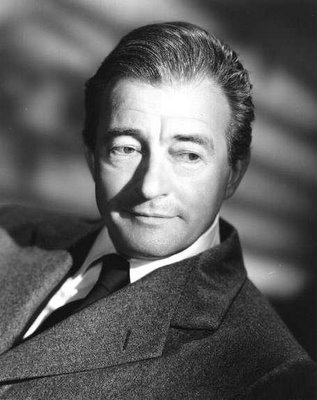 He was always impeccably dressed but never overdressed, unfailingly courteous even when portraying villains or the morally questionable, and carrying a face, not handsome, but close enough to it that it's plainness was perfectly responsive to inner feelings and not half an elegant mask for them. His eyes usually held a faint hint of weariness in the totally urbane manners with which he confronted the world and had patience with fools.
He was always impeccably dressed but never overdressed, unfailingly courteous even when portraying villains or the morally questionable, and carrying a face, not handsome, but close enough to it that it's plainness was perfectly responsive to inner feelings and not half an elegant mask for them. His eyes usually held a faint hint of weariness in the totally urbane manners with which he confronted the world and had patience with fools.Insofar as I would wish to project a serious writing persona, both here, and, especially, in the comment section of other blogs, that would be it. Insofar as I have any writing talent, I do my best to convey it. You will have to come to your own conclusions about how well I succeed.
I have been tempted to these reflections by my exploration of the new member of my blogroll, All Things Beautiful. The mistress, Alexandra von Maltzan, is pretty darn beautiful herself, and highly sensitive to the fact that clothes really do make the man, or the woman.
She has a post called Straight Eye For The Straight Guy down in her blog under the topic heading Fashion Trend Watch. In a previous post, she had compared Chief Justice
 John Roberts to Cary Grant, and, in Straight Eye, had this amplification of what she meant by it:
John Roberts to Cary Grant, and, in Straight Eye, had this amplification of what she meant by it:You therefore make your own style, which you feel conveys clearly what you stand for, and allows you to remain true to yourself. The ‘Integrity’ litmus test, essentially relies on what your wardrobe communicates to you about yourself. You don’t do integrity, you are integrity. Therefore there must never be a gap between what you say and what you wear.
Grant, I think had one of those faces so handome as to be half mask, which, since it was his best asset, he cultivated carefully. There are stories out there of his use of Preparation H to reduce the swelling of the bags of his eyes, and it is well known that, when on a shoot, he had a specific clause in his contract that he was not supposed to work after 5:30, lest fatigue, or too low a sun in the sky erode the least fraction of his chiseled good looks.
Alfred Hitchcock loved to use him. And he also loved to impishly tailor the events of the film against Grant's type, the elegant man always in control of circumstances and himself. In this he was wise as well as witty, the contrast brought forth Grant's type the greater for it.
The classic example is the racecourse scene in Notorious where Grant accompanies Ingrid Bergman, with whom is falling in love. Grant has connived for Bergman to marry the film's villain the day before (don't ask why, it's merely a part of Hitchcock's famous McGuffin which he used to drive the plot).
Bergman coolly and cruelly (for she is also falling in love with Grant) lets Grant know that she slept with the villain the night before. Grant is left standing there looking like a stuffed owl.
The villain, in case you hadn't guessed, was played by Claude Rains.
Grant's restrained but fashionable men's wear was also under Hitchcock's control when Grant was acting for him. Hitch imperiously decreed that Grant would never be filmed in anything but a solid, unpatterned tie.
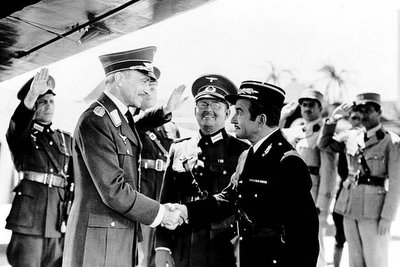 Rains' most famous role was that of the corrupt Vichy Republic police chief in Casablanca. He is smooth throughout, whether greeting his Nazi masters, schmoozing with Humphrey Bogart, or explictly trading a desperate newlywed a couple of exit visas for immediate sex.
Rains' most famous role was that of the corrupt Vichy Republic police chief in Casablanca. He is smooth throughout, whether greeting his Nazi masters, schmoozing with Humphrey Bogart, or explictly trading a desperate newlywed a couple of exit visas for immediate sex.Yes, I know, these were the days of the Hays Office. You have to be really paying attention to the film to catch the actual transaction, which is immediately cut away, but any adult would have known what it meant, particularly in those homefront World War II years, when the absence of the fighting men and the ever present itch in the loins made life a sexual banquet for those men too old to serve but young enough to perform, those who were exempt from the draft, and those who hadn't reached draft age. Both the words and the very concept of "juvenile delinquency" date precisely from those years.
The casual corruption of Rains' character, throws the aching love, nobility, and patriotism of Bogart, Bergman, and Paul Henreid into high relief:
How extravagant you are - throwing away women like that. Some day they may be scarce. Oh, I think now I shall pay a call on Yvonne, maybe get her on the rebound, huh?
Rains was one of the greatest and most talented pure actors ever to grace Hollywood, and capable of an extraordinary range of parts. He came from the London stage to Hollywood in his early forties and steadily worked for films or televison into his seventies. One of the joys of shows from "the golden age of television" that you can still obtain is when you happen across Rains in character. The hint of plainness in his face, combined with the sheer virtuosity of molding a character, allowed him to have a hairline mustache, or rimless glasses and become a totally different man.
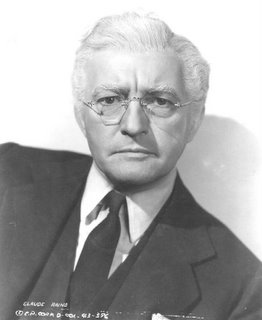
He appeared in 58 movies and from 1933 to 1951 there was no year in Hollywood when he was out of work.
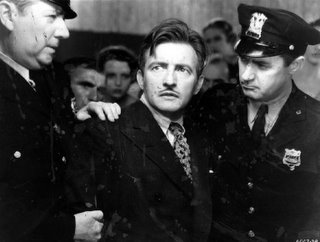
In his early years on the London stage, after serving in World War I, Rains was an instructor at the Royal Academy of Dramatic Art. Among his pupils were Sir Laurence Olivier and Sir John Gielgud, who admired Rains so much that he first started to pattern his own acting after that of his teacher, only later turning to Noel Coward as his model.
Rains was apparantly a very private man, and there are more memorable quotations from his characters than from him. Many Hollywood films of the period were written on the fly (including Casablanca) and I strongly suspect that simply writing lines for Rains while associating with him on the set brought out the best in writers. The large number of vivid and quotable lines of this type from his many roles certainly argues for this. Here is one of the few extended glimpses of the man himself from his co-star in Where Danger Lives, Faith Domergue:
I had some very difficult scenes to do with Claude Rains, and Mr. Rains was, indeed, a very formal man. You didn't call him Claude! He always came in very prepared with his lines learned right down to the last apostrophe. We would run through the scenes at night on the set with new lines added. We would have a fresh scene written every night, and we would rush to our dressing rooms to relearn the newly added lines because this had been done at night and we were doing the scenes in the morning. Claude Rains found this difficult to adapt to. He was never bad tempered but was a very structured actor, a splendid actor. He brought nuances to the part of the husband which were just incredible.
In Hollywood, Rains was generally, and still is today, thought of as primarily a character actor in supporting roles. But a surprising number of his films, foutreen in all, give him top billing, though he was superb in supporting roles as well, particularly playing suave and menacing villains. Here is one of the rare remarks he made on the subject:

I think playing villains is lovely! After all, we spend most of our lives trying to be good, trying to do what we know is right, don't we? We try not to hurt other people, or to give in to our wicked impulses. But at heart, we are primitive, like children. Often we'd secretly like to do the very things we discipline ourselves against. Isn't that true? Well, here in the movies I can be as mean, as wicked as I want to--and all without hurting anybody. Look at that lovely girl I've just shot!
He brought that same brio to roles as diverse as H.G. Wells' The Invisible Man, Senator Joseph Paine in Mr. Smith Goes to Washington, Julius Ceasar, The Phantom of the Opera, Sir John Talbot--worried father of The Wolf Man, King Herod in his last picture The Greatest Story Ever Told, and Napoleon Buonaparte.
Rains was unlucky in love. He went through six wives, a couple of them within a year after marriage. According to Sir John Gielgud, women found him absolutely magnetic. He probably would have been happier and fared better had he lived in our own time, where people, particularly entertainment people, euphemisticly "date" in affairs which are, in most cases, short term. He had one daughter and, by her testimony, they mutually adored one another.
He also very likely had a lonely old age. He was with his last wife a bare three years before she died of pancreatic cancer. Rains himself lingered on four more years, made two more movies, and appeared in one more play before dying in 1967 at 77.
To my mind, one of the most intriguing vehicles I have ever seen Rains in is the classic 1941 horror film The Wolfman. The film, along with Val Kilmer's Cat People, is one of the last great films from the fertile crop in the horror genre that emerged in the 1930's. The Wolf Man was not only Lon Chaney's breakthrough film into his major, though heartbreaking, career typecasting as a horror film star. It also featured a small, but extremely compelling performance from Bela Lugosi as Bela the Gypsy, one of Wolfman's victims. I personally think it the finest performance by Lugosi that I have ever seen.
The part of Sir John Talbot, English father of the doomed Chaney, was not a particularly compelling one. But, as in all his films, Rains brought to the role a depth and dimensionality that makes even this lightweight part just glow on the screen. In part because of the relative simplicity of the film's characters and dialog, Rains' performance throws the different levels of acting talent among the players into high relief.
They make hand bells in the Himilayan region that are famous for their sustained depth and strength of tone. There are two-metal, five-metal, and seven-metal bells, the last of which is both incredibly resonant and heartbreakingly beautiful beyond words. In The Wolf Man Chaney and most of the rest of the company are two metal bells, Lugosi steps beyond himself, becoming a five-metal bell, but Rains is easily and effortlessly a seven-metal bell.
I wish he were alive today. Sometime in the next decade, once time has given us more perspective, someone is going to inevitably make a movie about the Howard Dean presidential campaign, whether under the real names of the participants or thin pseudonyms. Claude Rains would have been the perfect actor to play Dean. Rains would easily sustain the gritty and abrasive edge in Dean, his sharply focused pugnatiousness, and the incredible shrewdness which parlayed a media hit-job (the famous "scream") on his candidacy into a role as one of the most important players in the rebuilding of the Democratic Party.
It would amuse Rains, as well, to sink his teeth into the part of the role where Howard Dean essentially plays himself--the eternal loose cannon of the media's fantasy who, because he's Howard Dean, can tell the blunt truth about the opposite party and its leaders which other prominent Democrats think, but find it inconvenient to say.
One of those fine lines from a character played by Claude Rains comes from one of his final film appearances--Lawrence of Arabia. He plays Mr. Dryden of the Arab Bureau, one of the half-amateur Colonial administrators that made the prowess of British spying so great in the first half of the 20th Century. It's a good line to end on. Thus Mr. Dryden:
A man who tells lies, like me, merely hides the truth. But a man who tells half-lies has forgotten where he put it.

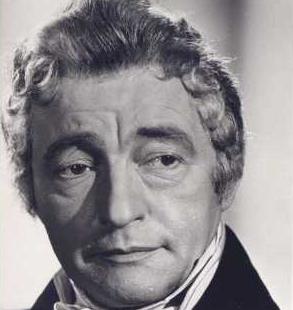
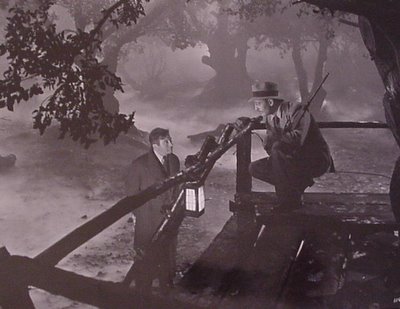

1 Comments:
it looks like you had a much more fabulous weekend than my own! ha ha, i spent it studying for finals. ughhh.
lovely blog, by the way!
Post a Comment
<< Home